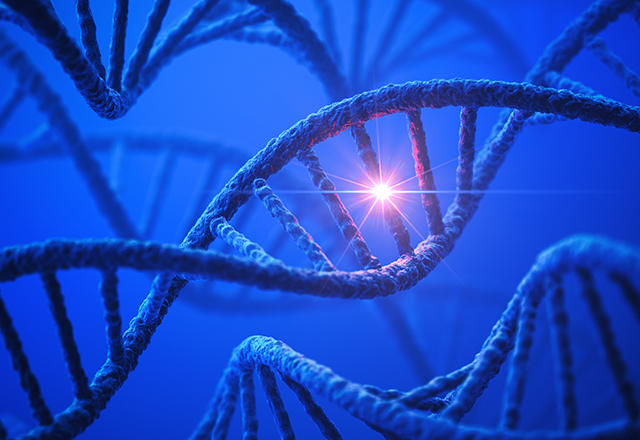It has long been known — thanks largely to work by Johns Hopkins’ own Bert Vogelstein — that cancer is a disease generally caused by an accumulation of genetic mutations. This is sometimes referred to as the somatic mutation theory.1 This hypothesis states that each time a cell divides and grows, there are opportunities for mutations to accumulate that impart upon that cell the hallmark traits of cancer, and that it is the acquisition of multiple mutations that underlie the transition from a normal cell to a malignant one. With this understanding of cancer and its causes, it would seem that mutations are detrimental, and more mutations would simply be more detrimental.
However, a rapidly growing body of work describes a seemingly contradictory theory — that a higher mutation burden, or number of mutations, in cancers is actually correlated to a better response to certain cancer therapies.2
Specifically, these studies describe the response of patients being treated with immune checkpoint inhibitor therapies. Checkpoint inhibitor therapy describes a class of drugs that works by enabling components of the patient’s own immune system to fight his or her cancer. For these therapies to be effective, the patient’s immune system must have the ability to both identify and kill cancerous cells. The immune system is constantly monitoring the proteins cells are making, and detection of abnormal proteins leads to immune-mediated killing. Cancer cells that have an exceedingly high number of genetic mutations are more likely to create mutated proteins, which the immune system recognizes as abnormal, thereby triggering the immune system to kill the cell.
However, cancer cells also exploit a different immune mechanism to escape being killed — immune checkpoints. Even if a cell expresses abnormal proteins, and the immune system may normally be able to recognize it as cancerous, the cell can utilize proteins called immune checkpoints at its surface to evade the immune system. This evasive signal is blocked by immune checkpoint inhibitor therapy, restoring the ability of the immune system to effectively kill those cells that are recognized as malignant. Thus, cancer types with high mutation burdens have generally been correlated with better response in patients given immune checkpoint inhibition therapy. At the same time, those that do not have as many mutations are generally correlated with a less robust response because the immune system will have a harder time recognizing these cancer cells. This principle seems to hold true across a large range of cancers. In a study by Mark Yarchoan analyzing 27 different cancer types, there was a significant correlation between mutation burden and patient response. However, the study also notes that certain cancer types, such as colorectal cell cancer with mismatch repair proficiency, have a response worse than expected, based on mutation burden.
Immunotherapy represents a powerful new frontier in cancer therapeutics that revolves around enabling patients’ own immune systems to better fight their cancer. Although drugs can suppress some of the inhibitory signals cancer cells send to the immune system, the immune system must still be able to recognize cancer cells as abnormal to destroy them. In general, cancers with more mutations are more likely to be detected as abnormal. Thus, the mutation paradox for cancer begins to make sense: Although certain specific mutations are what make cells cancerous in the first place, having a large number of overall mutations is generally viewed as beneficial in the context of immunotherapy, as it allows the immune system to recognize cancerous cells more effectively and destroy them.
Sources:
- Vogelstein B., Fearon ER, Hamilton SR, et al. Genetic Alterations During Colorectal-Tumor Development. N Engl J Med. 1988;319(9):525-532. doi:10.1056/NEJM198809013190901
- Yarchoan M, Hopkins A, Jaffee EM. Tumor Mutational Burden and Response Rate to PD-1 Inhibition. N Engl J Med. 2017;377(25):2500-2501. doi:10.1056/NEJMc1713444
- Chan TA, Yarchoan M, Jaffee E, et al. Development of Tumor Mutation Burden As an Immunotherapy Biomarker: Utility for the Oncology Clinic. Ann Oncol. 2019;30(1):44-56. doi:10.1093/annonc/mdy495

You should replace the picture with left-handed DNA with right-handed DNA at the top of this blog. Tom Pollard
I see you don't monetize hopkinsmedicine.org, don't waste your
traffic, you can earn additional bucks every month with new
monetization method. This is the best adsense alternative for any type of website (they approve all websites), for
more details simply search in gooogle: murgrabia's tools
Comments are closed.